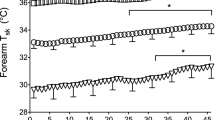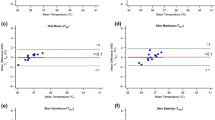Abstract
The purpose of this study was to investigate whether there are any effects of skin temperature changes on sweating response in the first few minutes of mild exercise. Six healthy males performed a bicycle exercise at 100 W (50 rpm) for 30 min under an ambient temperature of 23° C (40% RH). Esophageal temperature (T es), mean skin temperature (T– sk), local skin temperature at the lower left scapula (T sl), local sweating rate (M. sw), and cutaneous blood flow by laser-Doppler flowmetry (LDF) were measured continuously. Although T sl decreased markedly just after the onset of sweating, T– sk did not change. M. sw did not increase constantly in the early stages of exercise, and there was a temporary interruption in the increase of M. sw. This interruption in sweating was affected by the rate of change in T sl rather than by the absolute value of T sl, since there was a positive and significant correlation between the time of the interruption in the increase of M. sw and the rate of decrease in T sl (y=6.47x+0.04; r=0.86, P<0.05). The results suggest that sweating response in the early stages of exercise may be influenced by changes in local skin temperature due to evaporative cooling.
Similar content being viewed by others
Author information
Authors and Affiliations
Additional information
Received: 31 August 1995 / Revised: 26 February 1996 / Accepted: 26 July 1996,
Rights and permissions
About this article
Cite this article
Kondo, N., Nakadome, M., Zhang, K. et al. The effect of change in skin temperature due to evaporative cooling on sweating response during exercise. Int J Biometeorol 40, 99–102 (1997). https://doi.org/10.1007/s004840050026
Issue Date:
DOI: https://doi.org/10.1007/s004840050026




